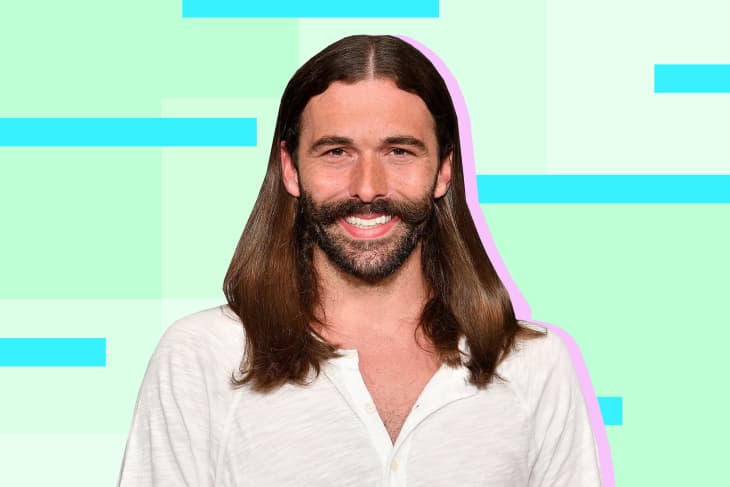JVN Hit Over 100 Episodes of “Getting Curious” and Hunny, We’ve Learned A Lot

There have been so many milestones to celebrate in the world of grooming expert-turned-figure skater Jonathan Van Ness. First, as we already know and have binged, the third season of Netflix’s “Queer Eye” premiered this month. Second, the Fab Five member turned 32 today (happy birthday, JVN!). And third, Van Ness’s beloved podcast “Getting Curious” aired over one-hundred episodes. Can you believe?!
As I listened to JVN recapping all of his fave podcast moments in his 101th episode, I did my own reminiscing on what stuck out in my mind—specifically, the meaningful lessons on home and wellness. Instead of keeping these tidbits of information to myself, I figured I would spread JVN’s tree of knowledge with the masses who have yet to engage in his audio show. After all, it’s Jonathan Van Ness’s world and we’re just (happily) living in it.
See below for my personal favorite lessons from JVN that got me feeling curious. And if you’re also an avid listener of his podcast, let us know of yours in the comments below!
Lesson #1: Skip the two-day shipping for the environment. (Episode: “What’s The Cutest Way To Fight Climate Change? with Anastasia Khoo”)
It’s hard to figure out where to start when it comes to fighting something like climate change, but Chief Marketing Officer of Conservation International Anastasia Khoo has an easy tip we can all start doing: avoid two-day shipping. Rush delivery means more deliveries need to be made, which is less efficient and more toxic for the environment. Another tip Khoo suggests? When traveling, take a direct flight versus one that connects, since most emissions are released during takeoff.
Lesson #2: Before you use a face mask, do your research. (Episode: “How Do We Treat Out Skin Like the Gorgeous Organ She Is?”)
We’ve all slapped on a mask without knowing the brand or the ingredients, but Vicky Tsai, the founder & CEO of Tatcha, tells us that not all masks are created equal. She sells masks using green tea, rice, and seaweed—what she claims is the basis of beautiful skin. She also gives some great advice when picking your product of choice: look it up on Environmental Working Group. She says that since your skin is a reflection of your health, it’s important to care about the ingredients and use data to back up the product.
Lesson #3: You have the power to melt toxic branches that create negative thoughts. (Episode: “What Is Toxic Stress & Why Is She So Bad? With Dr. Caroline Leaf”)
While it might seem like a given that we can erase negative thoughts, it’s easier said than done—and that’s where cognitive neuroscientist Dr. Caroline Leaf’s advice comes in. The secret to switching to positivity? Understanding that you are not your brain but you control your brain. “We can choose to react to negativity, which causes brain damage by creating neurochemical cells,” says Dr. Caroline. “As you start redesigning through thinking, asking, answering, discussing, you create an energy flow that makes the toxic branches literally melt; it is a choice, it is a decision.”
Lesson #4: Real estate thirst is the reason LA transformed into an “autopia.” (Episode: “How Did LA Become a Driving Dependent City? With Christina Copland”)
Did you ever wonder how Los Angeles became so car-dependent? Well, history Ph.D. candidate Christina Copland gives JVN and all of us listeners the rundown. When L.A. developed a railway in the early 1900s, a wealthier crowd started moving into the region and speculating in real estate. By the 1920s, L.A. gained the reputation of being the place to drive cars, and post-war times made that even more true with the focus on family and increase of suburban development.
Lesson #5: Self-love doesn’t come right away—and that’s okay. (Episode: “What Are You Up to, Lizzo?”)
American rapper Lizzo talked about the reality of no one being perfect—a reminder that we all need every once in a while. “I think that people are way too hard on themselves, and the human experience is the editing process,”she says. “You’re not going to come out of the womb perfect.” That “editing process” is only achieved through living and learning, and she put an emphasis on “self-love” being a developmental part of that journey.
Lesson #6: The key to recycling is helping people realize they can make a difference. (Episode: “What’s Really Going On with Recycling, Hunny? With Beth Porter”)
When the concept of recycling started becoming popularized in the ’80s and ’90s, no one knew how to recycle the proper way, and that created a lot of confusion and skepticism about recycling itself. Porter stresses that the way to counter this is in today’s world is to help individuals relate to recycling and “see ourselves” in it. “We’re in charge of not only putting stuff in the right bin, but making sure there’s a demand for recycled content…and demanding that producers make those responsible choices, too,” said Porter. Another tip: if you don’t know whether waste is recyclable or not, look it up so it doesn’t end up in the wrong place. Try using Earth911 so when you’re in doubt, you find out instead of throw it out.